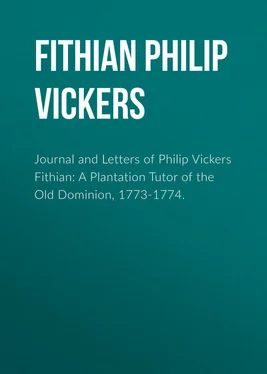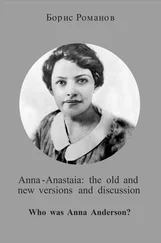Philip Fithian - Journal and Letters of Philip Vickers Fithian - A Plantation Tutor of the Old Dominion, 1773-1774.
Здесь есть возможность читать онлайн «Philip Fithian - Journal and Letters of Philip Vickers Fithian - A Plantation Tutor of the Old Dominion, 1773-1774.» — ознакомительный отрывок электронной книги совершенно бесплатно, а после прочтения отрывка купить полную версию. В некоторых случаях можно слушать аудио, скачать через торрент в формате fb2 и присутствует краткое содержание. Жанр: foreign_antique, foreign_prose, на английском языке. Описание произведения, (предисловие) а так же отзывы посетителей доступны на портале библиотеки ЛибКат.
- Название:Journal and Letters of Philip Vickers Fithian: A Plantation Tutor of the Old Dominion, 1773-1774.
- Автор:
- Жанр:
- Год:неизвестен
- ISBN:нет данных
- Рейтинг книги:3 / 5. Голосов: 1
-
Избранное:Добавить в избранное
- Отзывы:
-
Ваша оценка:
- 60
- 1
- 2
- 3
- 4
- 5
Journal and Letters of Philip Vickers Fithian: A Plantation Tutor of the Old Dominion, 1773-1774.: краткое содержание, описание и аннотация
Предлагаем к чтению аннотацию, описание, краткое содержание или предисловие (зависит от того, что написал сам автор книги «Journal and Letters of Philip Vickers Fithian: A Plantation Tutor of the Old Dominion, 1773-1774.»). Если вы не нашли необходимую информацию о книге — напишите в комментариях, мы постараемся отыскать её.
Journal and Letters of Philip Vickers Fithian: A Plantation Tutor of the Old Dominion, 1773-1774. — читать онлайн ознакомительный отрывок
Ниже представлен текст книги, разбитый по страницам. Система сохранения места последней прочитанной страницы, позволяет с удобством читать онлайн бесплатно книгу «Journal and Letters of Philip Vickers Fithian: A Plantation Tutor of the Old Dominion, 1773-1774.», без необходимости каждый раз заново искать на чём Вы остановились. Поставьте закладку, и сможете в любой момент перейти на страницу, на которой закончили чтение.
Интервал:
Закладка:
Set in a land abounding in excellent house sites, the planters' homes generally stood near the bank of one of the great rivers or upon some natural eminence. In the former case these houses had two fronts, a land and a water entrance. The approach from the public highway generally led through a wide avenue of trees, perhaps a mile or more in length, or the house might be shielded from the public gaze by a park of stately beeches or poplars. Since overland routes often presented serious difficulties, the Virginians made highroads of their rivers and creeks, and the side of the mansion facing the water generally constituted its true front. This is evidenced by the fact that one usually ascended the stairs from the water side. Isolated as the homes were, the Virginians were able to enjoy the seclusion so greatly prized by the gentry of the mother country, and they developed to a high degree the hospitable and generous traits and the love of outdoor sports that have usually characterized country squires. [20] Footnote_20_20 A British observer reported in 1779 that "… before the war, the hospitality of the country was such, that travellers always stopt at a plantation when they wanted to refresh themselves and their horses, where they always met with the most courteous treatment, and were supplied with every thing gratuitously; and if any neighbouring planters heard of any gentleman being at one of these ordinaries, they would send a negroe with an invitation to their own house." Cf. Anburey, Travels Through the Interior Parts of America , Vol. II, p. 198. This same traveller described the hospitality shown the guests at one of the James River plantations. "I spent a few days at Colonel Randolph's, at Tuckahoe, at whose house the usual hospitality of the country prevailed," he wrote. "It is built on a rising ground, having a most beautiful and commanding prospect of James River; on one side is Tuckahoe, which being the Indian name of that creek, he named his plantation Tuckahoe after it; his house seems to be built solely to answer the purposes of hospitality, which being constructed in a different manner than in most other countries; I shall describe it to you: It is in the form of an H, and has the appearance of two houses, joined by a large saloon; each wing has two stories, and four large rooms on a floor; in one the family reside, and the other is reserved solely for visitors: the saloon that unites them, is of a considerable magnitude, and on each side are doors; the ceiling is lofty, and to these they principally retire in the Summer, being but little incommoded by the sun, and by the doors of each of the houses, and those of the saloon being open, there is a constant circulation of air; they are furnished with four sophas, two on each side, besides chairs, and in the center there is generally a chandelier; these saloons answer the two purposes of a cool retreat from the scorching and sultry heat of the climate, and of an occasional ball-room. The outhouses are detached at some distance, that the house may be open to the air on all sides." Ibid. , p. 208.
The constant activity that centered about the great house is clearly reflected in the journals, letters, and account books of the day. Through their pages may be seen the great planter-businessmen, the members of their families, the overseers and stewards, the free white artisans, the Negro slaves, and the indentured servants moving about their daily tasks. The master of the plantation in a counting room near his mansion balances accounts, writes letters to his factors in England, or converses with the overseers and stewards from his other plantations who have come for instructions regarding their work. The children of the household and their tutor pass to and from the office used as a schoolroom. A ship from the homeland touches at the plantation landing and its captain comes ashore to bring letters and the latest news from the mother country, and perchance to dine at the planter's table. Visitors from neighboring plantations or from adjoining counties arrive in sloops or in coaches or sedans. Rooms reserved for guests are rarely empty and almost any event serves as the excuse for a celebration. A peripatetic dancing master arrives, the children of the neighborhood gather, and an informal dance is held after they have been singly instructed. Even passing strangers are accorded hospitable entertainment and treated as welcome guests. The planter and his family frequently ride out in a coach or chair for "an airing" or to call upon neighbors or relatives. On Sunday, if the weather be good, he takes his family by water to attend services at the parish church. Not infrequently a neighbor's servant arrives bearing venison or some other delicacy for the master's table.
Countless articles are bought or taken from the plantation stores. In the smith's shop nails and other articles are forged for plantation use, and the chair of a neighbor is mended or his plows pointed. Provisions are sent to the outlying plantations and supplies needed for the home place brought from them. In buildings near the mansion, tobacco is cured and prized. Hogsheads are rolled to the wharf to be shipped.
Such was the nature of the world about "Nomini Hall," the manor house of Robert Carter III in Westmoreland County, to which Philip Vickers Fithian, a young Princeton-bred theological student, went as a tutor to the children of the household in 1773.
CHAPTER TWO
Philip Fithian And The Carter Family
During his residence at "Nomini Hall" from October, 1773, to October, 1774, Philip Fithian recorded his impressions of the life about him in a daily journal and in letters to relatives and friends. These impressions constitute a detailed and illuminating account. The civilization he described differed in many respects from that he had known in New Jersey. His austere Presbyterian training caused him to look with disfavor or misgiving upon many of the gay diversions and other social customs of Virginia. Yet he was open-minded to an unusual degree and not unsympathetic to the people among whom he lived. His freshness of viewpoint led him to comment upon various features of Virginia civilization which would doubtless have escaped the attention of one more familiar with them. He admired many aspects of Southern life and for the members of the Carter household Fithian developed a genuine and lasting fondness. The account possesses both vivacity and charm.
At "Nomini Hall" Philip Fithian found himself in an excellent observation post. Robert Carter, its owner, was the scion of one of the wealthiest and most influential Tidewater families. His great-grandfather, John Carter, had emigrated to Virginia from England in 1649. Acquiring some 13,500 acres in the Northern Neck, the fertile region between the Rappahannock and Potomac rivers, John Carter had established his home "Corotoman" on the Rappahannock in Lancaster County. Becoming ere long a successful planter and businessman, Carter served first as a Burgess and then as a member of the governor's Council.
Robert or "King" Carter, son of the emigrant, so eclipsed his father that he has usually been regarded as founder of the family in Virginia. Bold, capable, and acquisitive, "King" Carter strove ceaselessly to expand the family fortunes. By strict attention to business and a close regard for his prerogatives as agent of the Fairfaxes, the proprietors of the Northern Neck, he ultimately became the richest and perhaps the most powerful man of his day in Virginia. [21] Footnote_21_21 Cf. Wright, Louis B., Letters of Robert Carter, 1720-1727 (San Marino, 1940), p. viii.
First as a Burgess and then as a member and President of the Council, he exerted a political influence that contributed greatly to the management of his private affairs. Realizing earlier than most the need future generations would have for fresh lands, he obtained for his progeny altogether some 333,000 acres.
Интервал:
Закладка:
Похожие книги на «Journal and Letters of Philip Vickers Fithian: A Plantation Tutor of the Old Dominion, 1773-1774.»
Представляем Вашему вниманию похожие книги на «Journal and Letters of Philip Vickers Fithian: A Plantation Tutor of the Old Dominion, 1773-1774.» списком для выбора. Мы отобрали схожую по названию и смыслу литературу в надежде предоставить читателям больше вариантов отыскать новые, интересные, ещё непрочитанные произведения.
Обсуждение, отзывы о книге «Journal and Letters of Philip Vickers Fithian: A Plantation Tutor of the Old Dominion, 1773-1774.» и просто собственные мнения читателей. Оставьте ваши комментарии, напишите, что Вы думаете о произведении, его смысле или главных героях. Укажите что конкретно понравилось, а что нет, и почему Вы так считаете.












